With the resurgence of vinyl records, understanding how to clean vinyl records is more crucial than ever to preserve their unique sound and tactile listening enjoyment, marking them as the epitome of musical ownership. Ensuring the longevity of your beloved vinyl collection hinges significantly on maintaining the cleanliness of each record.
Clean vinyl records not only guarantee a superior listening experience, minimizing unwanted noise, but also promise a lasting lifespan for your collection. Dive into our extensive guide on how to clean vinyl records and swiftly return to the world of unparalleled auditory delight.
This comprehensive guide is neatly segmented into three accessible sections (all include video clips), enabling a quick and easy understanding of the cleaning process.
Also, don’t miss out on our complete video overview embedded below, which offers a hands-on visual walkthrough on effectively cleaning vinyl records.
Keep your vinyl collection in pristine condition and relish the exceptional sound quality with our ultimate guide on how to clean vinyl records.
Guide Navigation:
- PART 1 – How to Clean Vinyl Records by Hand
- PART 2 – Step Up Your Game with a Record Cleaning Machine
- PART 3 – Frequently Asked Questions & Pro-Tips For Better Cleaning Results
PART 1 – How to Clean Vinyl Records by Hand
Time needed: 5 minutes
The easiest and cheapest way to clean vinyl records is undoubtedly by hand. With years of experience and research, this is the best way we know of to manually clean a record by hand.
- Clean Off Loose Dust with a Carbon Fiber Record Brush
The first step in any vinyl cleaning process should always be a dry clean using a carbon fiber record brush. We like the Audio Quest brush shown below, which has smaller fibers in greater quantity than a standard brush, plus improved conductivity to help neutralize static.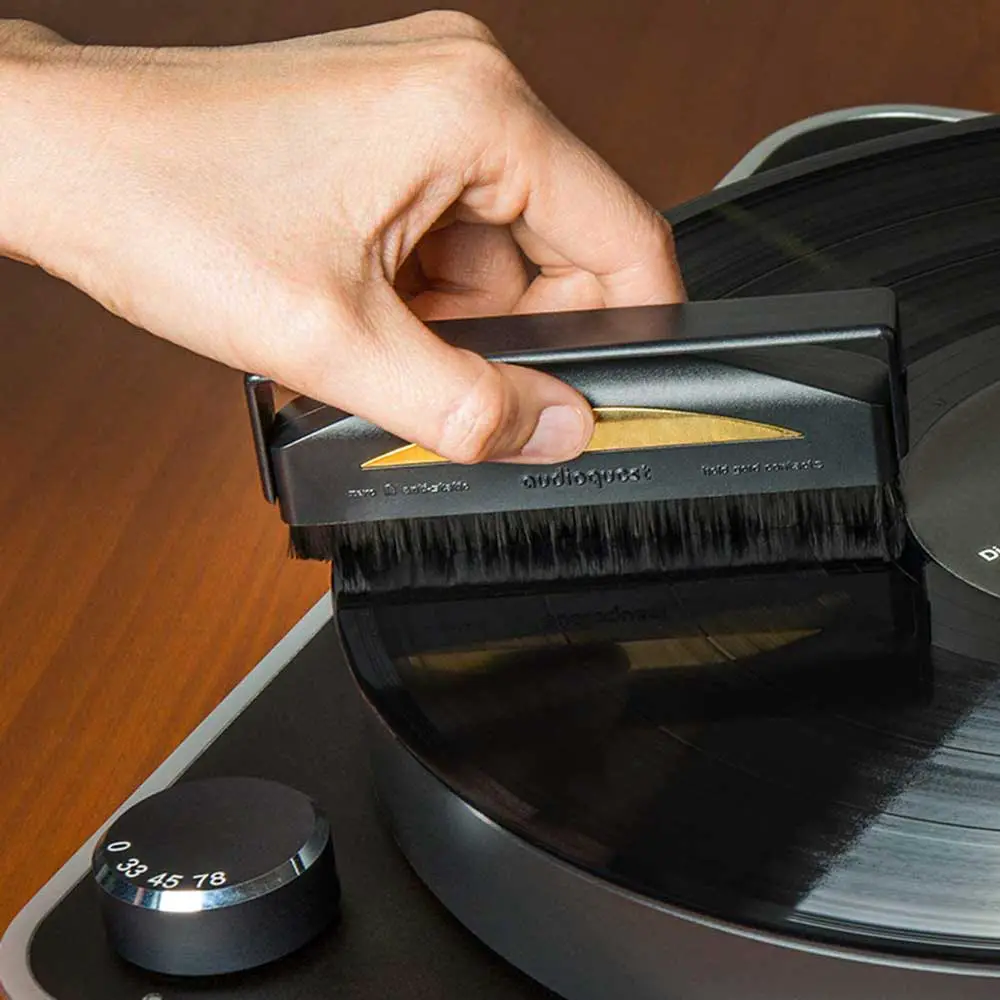
- Select The Right Record Cleaning Solution
With as much loose dust and particles removed as possible, we can safely progress to wet-cleaning the record. Failing to dry clean before this step will only risk pushing the loose dust into the groove to become sludge, which is difficult to remove.
For this step, you will need a record cleaning solution and a few other bit of kit:
GrooveWasher is by far our current favorite record cleaning fluid. Their G2 Fluid is a single-step cleaning method that leaves no residue behind, avoiding the need for any secondary rinse. The company performed years of research and testing, guided by the popular 1970s Discwasher. We’ve tested countless cleaning solutions on the market, and on balance, GrooveWasher is the fastest and most convenient manual hand-cleaning solution available. (GrooveWasher is available worldwide. Shipping is free inside the United States).
(Sound Matters readers receive 10% off direct orders from GrooveWasher when using the discount code: SOUNDMATTERS10).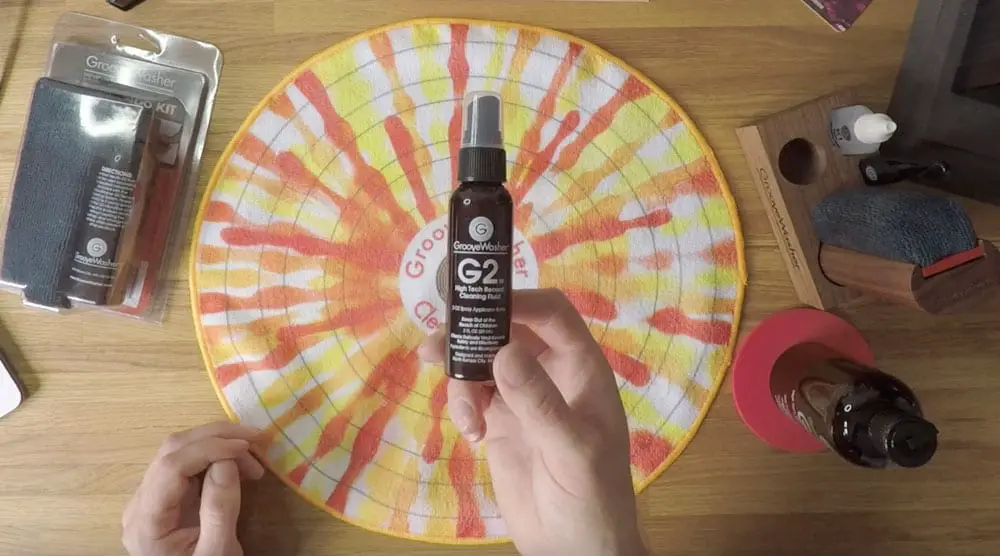
- Apply The Record Cleaning Fluid
Carefully place the record on the microfiber towel included in your GrooveWasher kit.
(If your kit does not include this towel, use a soft clean cloth or record cleaning mat). Place the record label protector disk on the record label. Spray 5 or 6 mist sprays to completely cover the record surface. Wait 10 seconds or more.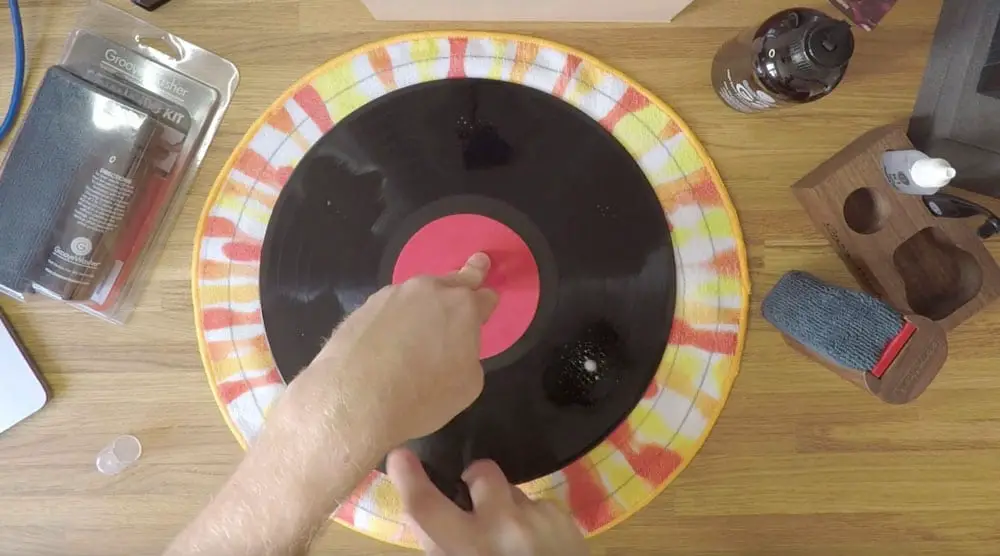
- Apply the Cleaning Pad to Your Record.
Lightly apply the leading edge of the pad to the record and wipe the record in concentric arcs (with the grooves, not across). Wipe the entire record at least 3 times with moderate pressure.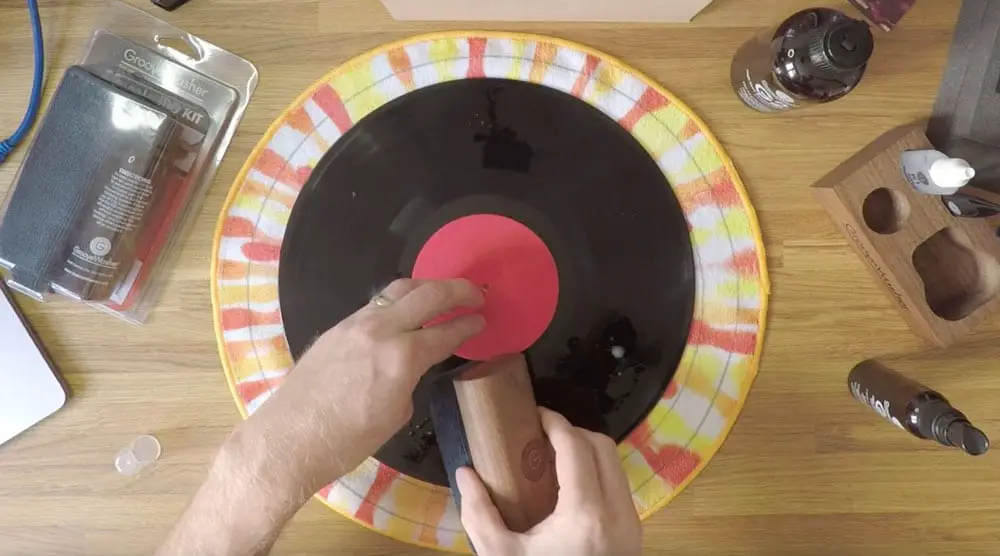
- Begin Rotating The Pad
Rotate the pad to gently dry and groom the surface. If visual inspection shows a problem area, spray it again with the G2 fluid, wait a few seconds, and use the pad to gently scrub the area, but only in the direction of the grooves. Seriously dirty records may require 2 or 3 cleanings.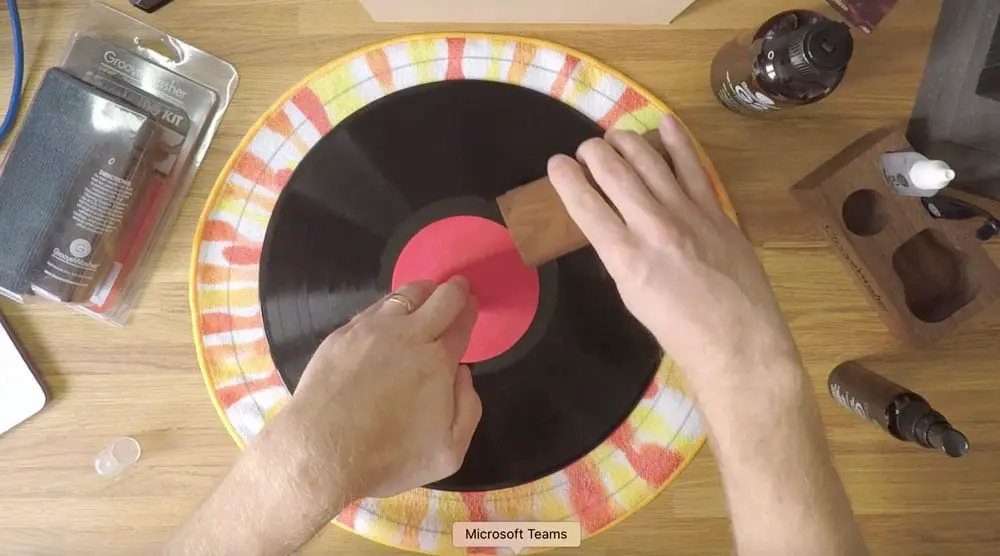
- Allow the record to air dry before playing.
You don’t want to play a record wet, or worse, return it to a sleeve while damp. Toast or dish racks make superb air-drying stands.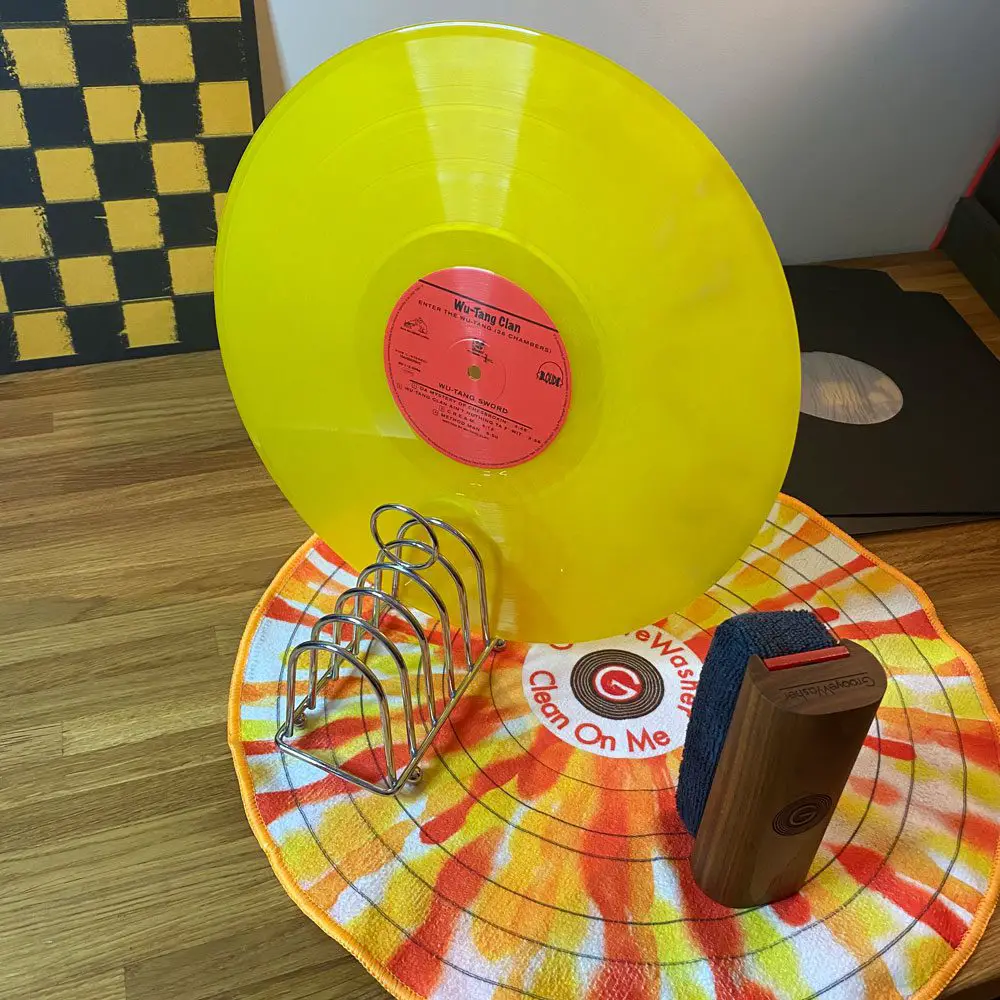
To hear some real results using GrooveWasher, listen to the embedded audio examples below (taken from our full GrooveWasher review). This fairly dirty record starts to clear up really well by the second and third cleaning.
Top Tip: Clean Your Microfiber Cloth or Replace it Regularly:
When cleaning vinyl by hand, it’s important to keep your microfiber cloth clean to avoid spreading dirt from one record to another.
You can use distilled water and a little dish detergent to gently clean microfiber cloths or a microfiber cleaning pad, such as the GrooveWasher option mentioned in this article. Thoroughly rinse the pad or cloth, followed by squeezing it to remove moisture.
Allow to air-dry overnight. Avoid putting microfiber cloths in the washing machine if you can, as this may pick up unwanted lint, which could contaminate—or even damage—your records.
The above step-by-step guide covers the basics. To take this one step further and truly deep clean your records by hand, check out my detailed video below with extra tips for those particularly dirty records!
PART 2 – Step Up Your Game with a Record Cleaning Machine
You can significantly speed up the process and potentially improve the result by investing in a record cleaning machine.
These primarily come in a few different varieties:
Vinyl Record Baths
Record baths, such as the Spin Clean Record Washer are a very cost-effective way to clean a lot of records in one sitting.
Cleaning by hand can be very effective, but it would take you a long time to clean a large collection or a batch of records from your latest record store shopping binge!
The device works by brushing both sides of a record at the same time while effectively giving your records a bath. Check out our full product review, here.
Or watch my step-by-step video demonstration below:
Vacuum-Based Record Cleaning Machines
Next up the record cleaning hierarchy is essentially a purpose-designed vacuum cleaner for your vinyl.
A machine like this will require a little up-front investment, but I can assure you it is entirely worth it for the amount of time you’ll save and the effectiveness of this cleaning method.
The fact remains, record cleaning machines are the most effective way to clean vinyl records. They’re so effective because, unlike manual cleaning, record cleaning machines work by sucking up the applied cleaning solution, which in turn takes all the dirt and grime away with it.
The Project VC-S3 Vinyl cleaner or its smaller cousin (The VC-E2) is great and will clean your records in just two rotations. (The Okki Nokki Record Cleaning Machine is another similar option).
Personally, I own the smaller Pro-Ject VC-E, as it’s far more compact than the full-sized VC-S3. Having reviewed both units, I find the performance to be the same – the only real difference is the tank size.
Check out our full review of the Pro-Ject Vacuum Record Cleaner, here. Or watch my full YouTube review below:
Ultrasonic Record Cleaning Machines
Ultrasonic cleaning (or cavitation) is regarded by many collectors as the best way to deep clean a record. The process works by creating lots of tiny cavitation bubbles in a cleaning bath. These bubbles form and collapse, releasing energy as heat and a small amount of pressure.
With the right setup, ultrasonic cleaning can help deep clean the grooves with very little contact – making it an extremely safe approach at the same time.
So what are your options when considering ultrasonic record cleaning machines?
Degritter MARK II
The Degritter MARK II is by far the best ultrasonic machine for cleaning vinyl records at home.
For some, the high price tag of over $3000 (or over £2500) will be a deal-breaker, but I must say, having owned the machine for several months now, it is categorically the best ultrasonic record cleaning machine for home use I’ve ever tested.
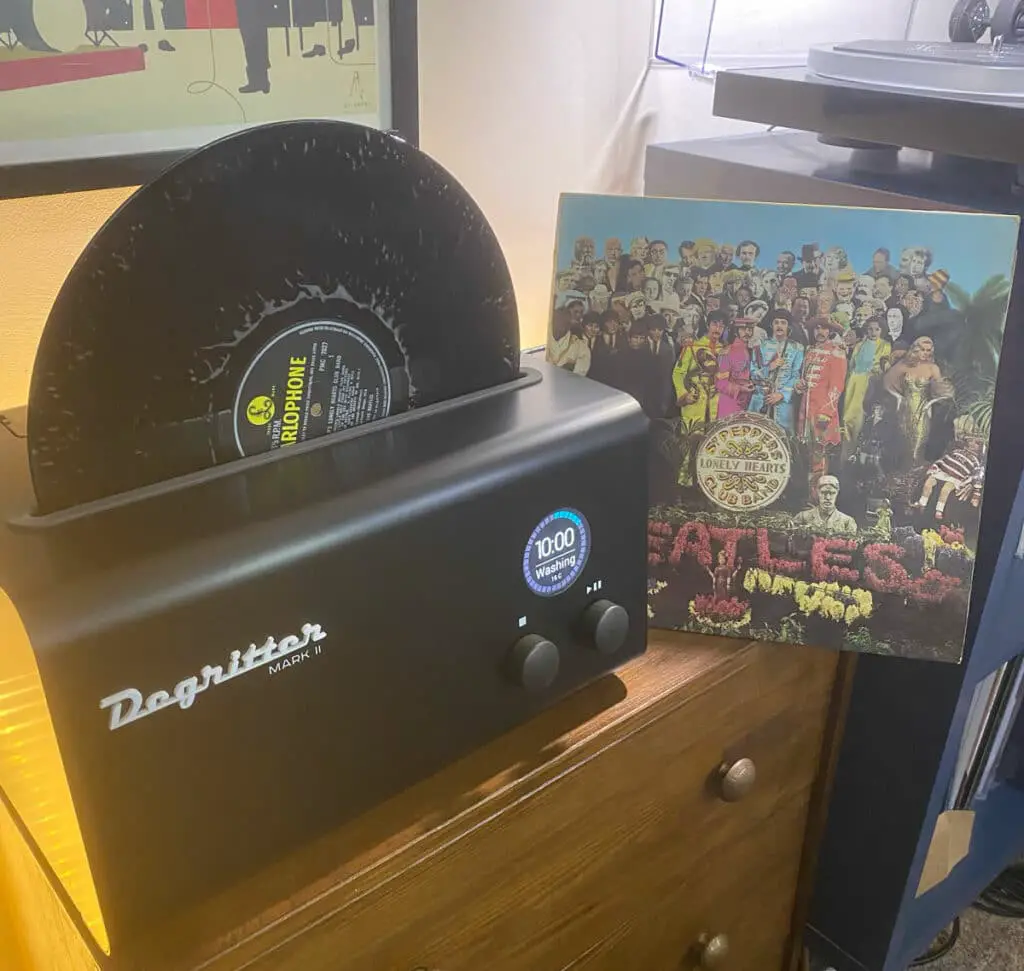
Fully automated and simple to use, all you have to do is place your record into the slot, choose between a quick, medium, or heavy cleaning cycle, press start, and let the Degritter take care fo the rest.
This automated cleaning cycle includes drying the record, so you’ll be ready to spin the record once the cleaning program stops.
HumminGuru Ultrasonic
For those on a budget, the Kickstarter-funded HumminGuru comes in at a much lower cost of just $478.
Similarly to the Degritter, the machine has a fully automated clean and dry cycle, so you can leave the room and allow the HumminGuru to take care of the rest.
Does it work as well as the Degritter? We’ll that would be an unfair comparison given the price gap, but for the lower entry cost, the HumminGuru is a good, affordable alternative for record collectors wanting to add ultrasonic record cleaning as part of their vinyl cleaning process.
TIP: My advice with any ultrasonic record cleaning machine: You can improve the results further by adding a surfactant (Groovewasher now makes one called G-Sonic). You add 10-drops to every gallon of distilled water, mix it together, and then pour the liquid into your ultrasonic tank.
Surfactants help to reduce the water’s surface tension and aid in the deep cleaning of record grooves. Without the addition of surfactants in any record cleaning fluid, pure water can fail to penetrate the microscopic groove and end up just sitting on the record surface.
Check out my full review of the HumminGuru here, or watch the video overview below:
PART 3 – Frequently Asked Questions About Record Cleaning
Below, we’ve collated the most frequently asked questions we receive about record cleaning. Scroll down for the answer to each question:
The simple answer is, it depends. As mentioned earlier in this article, you should use a carbon fiber record brush (before and after each playback) to help reduce static and dust build-up. If you follow this routine and store your vinyl records correctly in a good quality inner sleeve, then you shouldn’t actually have to wet clean your records very often.
It’s best not to over-clean a vinyl record; simply use your ears. If it sounds dirty and there are pops and clicks, then by all means, give the record a clean. The best approach is to look after your records in such a way that wet cleaning is a rare requirement. Prevention is better than cure.
The use of alcohol to clean vinyl records is a contentious topic. Some swear by it; others stay well-clear.
Here’s where we stand: Firstly, you should NEVER use isopropyl alcohol on shellac records as it will dissolve the surface.
But also on modern PVC vinyl, it is thought by many to cause the leaching of plasticizers, making them brittle and subject to excess wear.
Many record cleaners contain some isopropyl alcohol as part of the mix, but as a rule, we recommend steering clear of any fluid that contains a high amount of alcohol. If you can smell alcohol in your record cleaner, chances are, it’s using far too much. Our motto is: why use a sledgehammer to kill a fly.
You can clean old vinyl records in just the same way as new vinyl records (so long as they’re modern PVC and not shellac 78s). Shellac 78s are particularly brittle, so you need to take extra care as they can crack or shatter if you’re not careful. When wet cleaning shellac records, make 100% sure the record cleaning fluid does not contain alcohol (see section above on cleaning vinyl records with alcohol).
If an old record is particularly dirty, you may need to clean it multiple times to get the desired result. You might even find that the first clean makes the record sound worse at first, as the fluid starts to loosen stubborn dirt and grime. In this case, you will almost certainly see gunk start to build on your stylus. If that’s the case, stop the record, clean your stylus (needle), clean it again, and see if this improves the situation. Patience will be rewarded; in some cases, we’re talking about records that are over 50 – 70 years old.
You may also find that leaving the record cleaning fluid on the surface for longer than the usual time of up to a minute will give the ingredients more time to work.
Lastly, opting for a stronger record cleaning fluid (such as the new G3 Fluid from GrooveWasher) can improve the results when cleaning very dirty, old records. The trade-off when dealing with a stronger fluid is that you will need to perform a second rinse step to ensure no residue is left behind.
This question comes up a lot – almost as though deep cleaning is somehow separate from regular record cleaning.
The truth is, deep cleaning your records is a matter of patience and trial and error. By deep cleaning your vinyl records, we assume you mean getting them as clean as possible, and so, by definition, achieving a deep clean depends on how dirty the record is.
Ultrasonic record cleaning is the best way to deep clean vinyl records that have stubborn and entrenched dirt deep in the groove. (See our section in this article covering ultrasonic record cleaning machines).
That said, in many cases, you can deep clean a vinyl record perfectly well with a good record cleaning solution. The only way to check if a record has been “deep cleaned” is to take before and after shots of the record surface using a USB microscope. For some, this might be a step too far, but if you want to really see what’s going on in those microscopic grooves, it’s the only measurable way to tell beyond detailed listening tests.
Our advice is to avoid household cleaning products that were never purpose-made and designed to clean vinyl records.
The ingredients on a bottle of Windex are quite vast, and I cannot fully guarantee their safety for cleaning records. Therefore, we recommend sticking to record cleaning fluids designed by experienced companies who know what they’re doing in a lab.
Tap water should be avoided at all costs – particularly if you live in a hard water area. The reason is that regular tap water contains impurities, such as mineral deposits, which can contaminate and damage records.
Have you ever tried putting regular tap water in a household iron? Note how quickly hard water can clog up your iron with limescale deposits. Our advice is always to use a purpose-made record cleaning fluid; stick to distilled water if you use it to rinse a record, and avoid household cleaning products such as soap.
The process involves spreading a solid layer of wood glue over the record surface (avoiding the label). When left to dry overnight, the glue dries clear – picking up dirt and dust deep inside the grooves. The idea is, all the grime is removed when peeling back the glue.
I wouldn’t like to take the risk on a rare or expensive record; what if the glue doesn’t peel off in one piece!? Not to mention the risk of residue contaminating your records and stylus. It’s also very time-consuming, and at one side per night, it would take you a long time to complete your entire collection. Why take the risk when record cleaning solutions are relatively inexpensive?
The wood glue vinyl cleaning method is popular among some collectors, and while it’s ultimately each to their own when it comes to record cleaning methods, it’s not an approach we advocate at Sound Matters.
Don’t! By now, I’m sure you’re sensing a pattern – avoid alternative cleaning methods. With this one, however, it’s particularly important to note that vinegar contains acetic acid, which, if mixed with alcohol later down the line from another record cleaning fluid, could risk melting the record and causing permanent damage.
When dealing with dirty records, your record needle (more accurately known as the stylus) will undoubtedly build up gunk and dust as it tracks the record groove. You’ll want to get these records clean as soon as possible, as playing dirty records will speed up the wear of your stylus and records.
We recommend cleaning your needle/stylus after each record with a stylus cleaning kit. Our preferred record cleaning fluid supplier, GrooveWasher, makes a great stylus cleaning kit. The brush is long and curved, with an ergonomic handle, making it easy to reach under the stylus to clean away any grime or dust safely.
Simply apply a small amount of cleaning fluid and always pull the brush from back to front so as not to damage the cantilever in the process. For a full guide on how to clean your needle/stylus – check out our full feature and video instructions.
We get asked this question a lot: can I DIY my own record cleaning solution? As mentioned earlier in the article, we prefer to leave the chemistry to professionals who have the knowledge and background in developing safe and effective record cleaning fluids.
However, homemade record cleaning solutions are very popular with many collectors, so if you do choose to go down this route, here’s some advice we recommend sticking to:
– Always use distilled water; never use tap water, as it contains impurities that will undoubtedly damage your records.
– De-ionized water is not the same as distilled water. The process of creating de-ionized water does not kill off any bacteria, and therefore, distilled water is much safer for cleaning vinyl records.
– If you choose to add isopropyl alcohol to your mix, keep the quantity to a low level. As mentioned, there is much debate about the safety of alcohol on PVC-based vinyl records, but given the lack of industry consensus on safety, it’s best to stay on the safe side. 1% of your overall cleaning fluid is a good place to start.
– Add a surfactant to your solution to improve the cleaning quality. Surfactants help reduce the surface tension of your cleaning fluid and allow the liquid to penetrate the groove fully. Record grooves exist on a microscopic level, of course, so without a surfactant, your cleaning fluid might only sit on the surface of the record and will not effectively clean deep into the groove.
While it is perfectly possible to clean records effectively by hand, a record cleaning machine will make light work of cleaning large amounts of records in one sitting.
Record cleaning machines can also improve the effectiveness of your cleaning as vacuum-based machines physically such the fluid from the record surface as opposed to relying on cloth or pad absorption.
In the case of ultrasonic record cleaning machines, these have the added advantage of getting deep into the record groove thanks to the ultrasonic frequencies that create lots of tiny cavitation bubbles, which gently lift dirt and grime deep within the grooves where brushes or cleaning pads might struggle to reach. Learn more about the pros and cons of record cleaning machines vs cleaning by hand, here.
Different record-cleaning cloths or pads suit different requirements. For example, my go-to record cleaning fluid supplier makes three distinctly different cleaning pads:
1 – A Microfiber Cloth Pad. This is a great all-rounder with high absorption, which is perfect for mopping up the cleaning fluid that holds the dust and grime in suspension.
2 – The “Black Magic” Pad. A velvet-like pad with very fine fibers that dig deeper into the groove. Great for adding some “mechanical” cleaning action on very dirty old records either as a pre-clean by hand or with a record cleaning machine.
3 – A Suede Pad. This very soft pad is perfect for giving records a gentle clean on your turntable just before spinning.
If you only buy one cloth, then a standard microfiber cloth is the best all-rounder.
Wrapping Up – The Best Way To Clean Vinyl Records
The aim of the game is to get your records as clean as possible without doing any harm to the record. There’s no point using a heavy-handed approach that leaves the disk spotless but destroys the groove and sound quality in the process.
Ask ten people how to clean vinyl records, and you’ll likely get ten different responses.
More often than not, you’ll hear conflicting advice, as there will always be one collector who claims they’ve been cleaning their records with soap and water or high amounts of alcohol for decades without any adverse effects.
Perhaps they have, perhaps they haven’t; it can be difficult to detect the slow deterioration of a record over time, so you’ve got to question the certainty of such a claim.
A gentle and patient approach is preferable if you want to avoid damage, and that’s the advice I advocate.
Take your time, and don’t forget to enjoy the music as you go along. Vinyl is not a clinical medium; there will always be some degree of surface noise, but that’s all part and parcel of the genuine and authentic experience of music on wax.

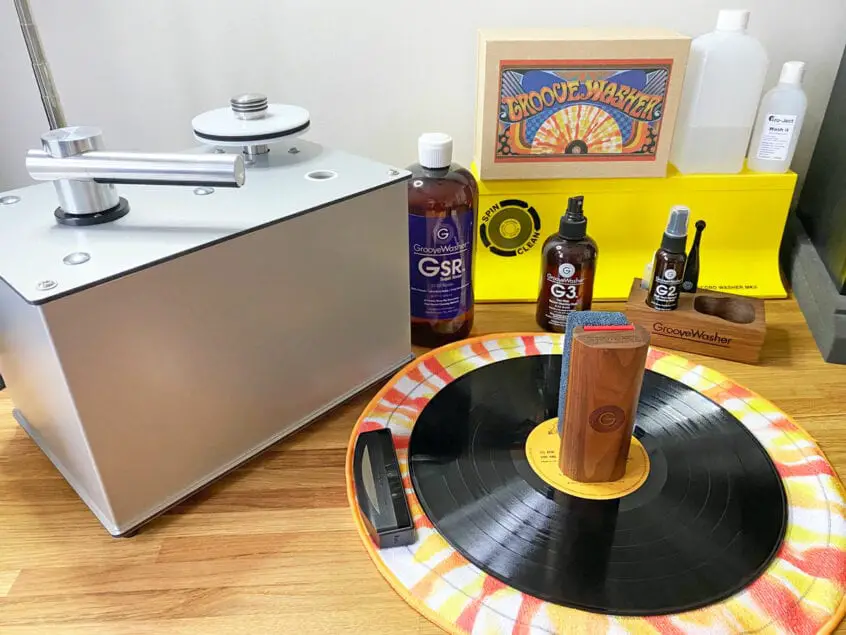


Thanks for the awesome guide! As a fellow vinyl lover, I’d like to add a quick tip: consider investing in anti-static inner sleeves. They’re a game-changer for keeping dust and static at bay, especially if you live in a dry climate. Happy spinning, everyone! ????????
Thanks for your comment and kind words. 100% on the inner sleeves – a must! Happy listening
Thank you for the very detailed list on how to clean vinyl records. I always found the come common go-to way of cleaning them in the dishwasher was unsanitary. I will recommend these methods to my clients.
Great article
Glad it was helpful, Nige
A virtually zero cost effective solution to cleaning vinyl records: fill a bowl with Luke warm water and add a little washing up liquid. Wash the disc by hand rotating with one hand and washing in the direction of the grooves with the other hand. Cold rinse the disc and dry it vertically by leaning almost upright against the kitchen tiles, putting a towel under the disc to catch water run off. This virtually cost free solution returns the disc to sparkling appearance and removes the dirt built up over years of use.
Hello, With all these cleaning demos it would be nice to hear a before and after cleaning demo.So far I only found ultrasonic cleaning provided a vast improvement in sound quality
Nice article I tried a lot of things to clean my records, Even using a Q-typ (Trust me this works) spreading my fluid on the record as it spins wiggle the Q-tip back and forth but it took a long time. Then I got into I got into the ultrasonic cavitation machine, I bought just the machine & built the rest, That works Great!!!! After letting it spin dry for a while I still felt there was still water on the record after playing them, & I needed to get it all off the record. So I got the Project machine you had in your video & that did the trick. I use the Project machine solo most of the time, & the fluid I use is L Art du Sun or TM-8. I don’t use distilled water I use reverse osmosis water.
Very informative article, on cleaning long playing records.
Dishwasher cleaning has been my go to for years. I always clean before playing. As others have stated storing is part of the process ( inner sleeves and outer covers. ) apparently the method of all the machines really at the price point is not significantly better than taking one’s time and doing it yourself. I will however say a good brush and micro clothes can help.
[…] of taking home a used, dirty record from the store and slowly bringing it back to life using a good record cleaner. Perhaps you need to be of a certain mental persuasion to enjoy having to work for your music, so […]
[…] a detailed guide on how to look after your vinyl records, how to clean vinyl records, and store your collection, consider starting with the Sound Matters guides on this […]
I’ve been using Pledge MultiSurface wipes, and they’ve worked out great! Also, I wipe counter-clockwise; when the record plays, the needle pushes the loose dust out of the groove, so you can just wipe it off.
what are the active ingredients in GrooveWasher apart from demineralized water?
All the antistatic brushes I have used sofar increase static electricity to the point of a cracling sound just handling the vinyl. Is there one antistatic brush out there that does work?
No none of them eliminate static but do the opposite which is caused by friction,even the audioquest brush with it”s gold strip on the handle.You need to buy a Milty antistatic gun,and dont forget to keep the humidity up where you live as dry air causes more static
Use a grounding wrist strap or some way to ground yourself while brushing. I have one of the metal all thread rods/legs grounded to an outlet and just touch it while brushing.
[…] the built-up dust and grime will also speed up stylus wear. There are plenty of affordable ways to clean vinyl records, and we’ve covered most of them extensively throughout this website. Do yourself a favor and […]
[…] the first two episodes: The first is an introduction episode, and the second is a feature on ‘how to clean vinyl records‘ (one of our most popular topics with […]
[…] regards to used vinyl, it’s fairly obvious that you should always clean these records before they grace your turntable; you never know what dust or grime is lurking in the record […]
[…] we like to say a Sound Matters, great vinyl records are clean vinyl records. I’m slightly obsessed with cleaning vinyl, and in many ways, I find the whole process […]
[…] ten people how to clean vinyl records, and you’ll undoubtedly get ten different answers. As the saying goes, “there’s […]
[…] Ask ten people how to clean vinyl records and you’ll get ten different answers. The steps we’ve outlined are a quick and easy way to get started by hand. Those wishing to clean large amounts of vinyl may want to consider investing in a record cleaning machine, such as a simple record bath, or a more advanced, dedicated record cleaning machine. For more info on the many different methods and machines available, check out our feature article on how to clean vinyl records. […]
[…] an ideal world, we’d all be able to clean vinyl records with a fancy, purpose-built device, such as a vinyl vacuum system or an ultrasonic cleaning setup. […]
[…] clean is essential if you want them to sound great for a lifetime and beyond. For this reason, vinyl record cleaning remains one of the most-read topics on Sound […]
I have a substantial record collection dating back to the 70’s. I have taken very good care of the collection with after market inner and outer sleeves and Disc Washer products. However, all vinyl is not created equal especially from the late 80’s. I have LP’s that look perfect and are as noisy as farm equipment. Just sayin’.
Right on Dan …I have used Discwasher as a record cleaning system for 45 years or more with Original Master Sleeves from Mofi and I am completely satisfied – I have obtained used vinyl cleaned with record cleaning machines that are noisy but improve audibly after I clean them with Discwasher
[…] Learn more about how to clean vinyl records, here. […]
I need help!
I took out one of my very rare albums after many years of not playing it (like 25 years!). In several places on the disc, the paper liner was stuck to the record. Now it seems like trying to remove a price tag – – as if the paper were adhered with a glue.
What can I do ????
Thanks !
Brian
Oh no! That does sound bad. It’s difficult to tell what’s going on without seeing, but I can only imagine it’s caused by the conditions in storage. Is it plain paper sleeves that caused the problem or ones with an inside anti-static lining?
Have you tried any cleaning methods at all so far? Can you supply a picture?
Thanks Marc … I will get you a picture sometime later today. Very much appreciate your offer to help.
Cheers, Brian
[…] covered plenty of conventional methods for cleaning vinyl records at Sound Matters – from relatively expensive vinyl cleaning machines to humble but effective […]